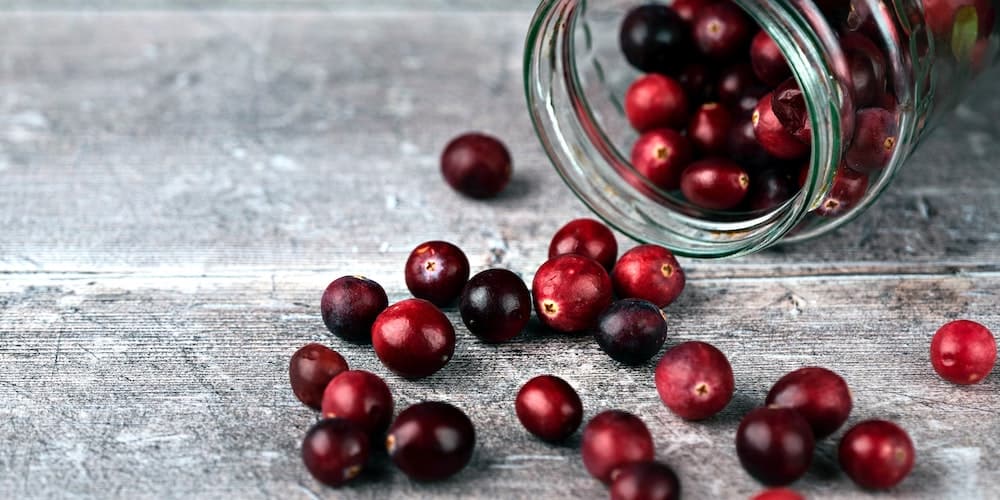BIENFAITS DE LA CRANBERRY
✓ Prévient les infections urinaires
✓ Protège le coeur
✓ Lutte contre les bactéries
✓ Améliore la santé bucco-dentaire
What is cranberry?
The cranberry (Vaccinum macrocarpon) is also called “large lingonberry” or “cranberry“. It belongs to the Ericaceae family, like the blueberry or strawberry tree.
Originally from North America, the plant grows wild in peat bogs. It is also cultivated in sandy fields called “cranberry bogs“. In September-October, they are flooded to allow the ripe fruits to float and be harvested more easily. The United States and Canada are the world’s main producers.
The red berries are appreciated for their tart taste. They can be consumed fresh or dried, and are used in the preparation of juice, jam, cakes…
Beyond their taste, they also have health benefits. Protective of the urinary system, they prevent certain infections like cystitis.
Also read The best dietary supplements against urinary infections
Their consumption is also beneficial for the cardiovascular system. Finally, cranberries are antibacterial and support oral health.
Nutritional Composition
- Amino Acids
- Vitamins : B5, B6, C, E, K1
- Minerals and Trace Elements : potassium, phosphorus, calcium, magnesium, copper, iron, manganese
- Carbohydrates
- Fibers
- Proteins
- Lipids
- Antioxidant Actives : anthocyanins, flavonoids, polyphenols
- Organic Acids : ursolic acid, quinic acid, benzoic acid
- Tannins : proanthocyanidins, epicatechins
- Water
The Benefits of Cranberry
🌸 Prevents Urinary Tract Infections
Its consumption is beneficial for preventing urinary tract infections. It notably reduces the risk of cystitis in women.
The berries contain proanthocyanidins. These flavonoids prevent the adhesion of bacteria responsible for infections, like Escherichia coli, to urinary walls. Unable to attach to the mucosa, they are expelled through urine.
Moreover, cranberry acidifies the pH of urine. This acidic environment prevents the development of pathogenic bacteria.
This review shows the effectiveness of cranberry in preventing urinary tract infections.
❤️ Protects the Heart
Cranberry has beneficial effects on the cardiovascular system. It protects the heart and prevents certain diseases like atherosclerosis. For this, it reduces the risk factors for heart diseases.
Its antioxidant polyphenols, for instance, lower levels of bad cholesterol (LDL cholesterol) and increase those of good cholesterol (HDL cholesterol).
Moreover, they reduce platelet aggregation and decrease blood pressure.
Finally, cranberry supports cardiovascular health through antithrombotic and anti-inflammatory mechanisms.
This review focuses on its action on cardiovascular risk factors.
🦠 Fights Bacteria
Thanks to its antibacterial action, it can reduce the development and concentration of pathogenic bacteria.
It has been particularly effective against the Helicobacter pylori bacteria, responsible for gastric ulcers and stomach cancer.
This study from Peking University, conducted on adults, shows the antibacterial activity of cranberry juice on Helicobacter pylori.
👄 Improves Oral Health
Consuming cranberries contributes to oral health and oral hygiene. This is why it is found in many products: toothpaste, gel, paste…
On one hand, its antibacterial action prevents the adhesion of certain bacteria to the mouth’s mucosa. It creates a protective biofilm against pathogens.
On the other hand, it prevents the appearance of cavities caused by Streptococcus mutans bacteria.
Finally, it can relieve gum inflammation such as gingivitis and periodontitis.
This review focuses on its beneficial effects on oral health.
How to consume it?
As fresh or dried berries
Cranberries are available fresh or dried. They can be eaten as is if you enjoy their tangy taste.
You can also add them to your sweet recipes (cakes, jam, jelly…) and to your drinks (tea, herbal tea, smoothie…). They also pair well with meat and poultry (turkey).
As juice
You can find pure cranberry juice, made of 100% berry juice. There are also cocktails where cranberry is mixed with other fruits: apples, grapes, raspberries…
In this case, it is advisable to choose a drink containing at least 25% cranberry juice to reap its benefits.
As capsules
Capsules are taken as a dietary supplement, especially for urinary comfort. They contain dehydrated juice or berry powder.
Choose capsules with a high content of proanthocyanidins (at least 35 mg/capsule).
They should be non-GMO, without additives and excipients.
Opt for organic cranberries
The cranberry is a plant sensitive to diseases and pests. It often receives chemical treatments.
If you can, choose fruits grown with organic farming. This ensures the absence of pesticide residues and a cultivation that respects the environment.
Also prioritize hand-picked berries, from artisanal and sustainable farming.
Dosage
The average recommended dosage is 500 ml of juice per day or 300 to 1500 mg per day for capsules.
Contraindications and side effects
Its consumption presents certain contraindications:
- As a precaution, it is not recommended for pregnant and breastfeeding women;
- Due to the presence of oxalates, people suffering from kidney stones should avoid consuming it;
- People who are overweight or diabetic should consume it in moderation;
- Cranberry may interact with certain medications such as anticoagulants. Consult your doctor if you are undergoing treatment.
Its consumption may cause certain adverse effects:
- Stomach aches
- Diarrhea
- Bloating
If you experience side effects, stop consumption and consult a doctor.
Sources and scientific studies
RG Jepson, J C Craig, 2008. Cranberries for preventing urinary tract infections.
Diane L McKay, Jeffrey B Blumberg, 2007. Cranberries (Vaccinium macrocarpon) and cardiovascular disease risk factors.
Lian Zhang, Junling Ma, Kaifeng Pan, Vay Liang W Go, Junshi Chen, Wei-cheng You, 2005. Efficacy of cranberry juice on Helicobacter pylori infection: a double-blind, randomized placebo-controlled trial.
C Bodet, D Grenier, F Chandad, I Ofek, D Steinberg, E I Weiss, 2008. Potential oral health benefits of cranberry.



